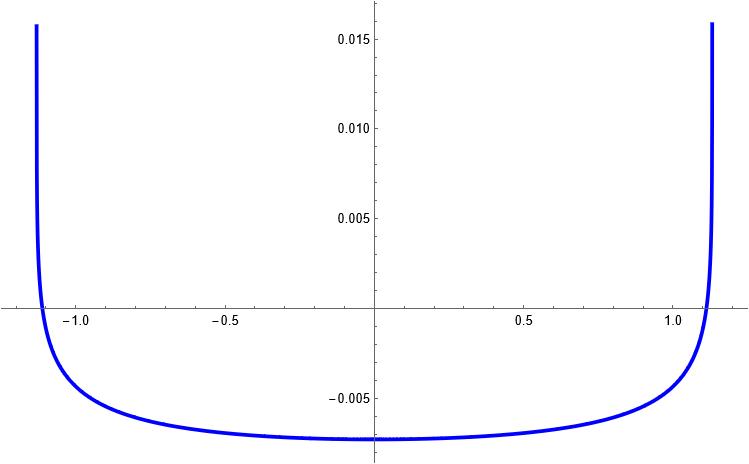I have a code where I'm using FindRoot for the equation toroottp. I plug in some sample values on zs,zQ,sig,zh and plot toroot to get a feeling of its range.
I have tried using tp[9,9.30685,-15.50169,10] but it produces some errors. I know the error occurs because clearly near zs=1.1 the plot diverges (the plot is symmetric so there are two roots, one in the positive the other in the negative but choosing the positive wil suffice). The range I put for FindRoot say, {tp, 1, 0.8, 1.15} produces an error, but if I reduce the upper limit a little bit, say, {tp, 1, 0.8, 1.12} then it produces no error.
The question is how do I set up FindRoot so that it will not produce an error even if my proposed range goes beyond those that converge. I want to resolve this since I will change my parameters later and use this for other commands, this is a problem since I do not know beforehand where exactly is the root and where it starts to diverge as in the plot. You cannot expect me to check one point at a time just to make sure there is no error, that will be adsurd, but I guess any improvement on my setup will still be beneficial. The major problem here is the upper limit. On the other hand, I think no matter how I change the parameters the plots will have the same form so resolving the upper limit issue wil suffice I guess. Any guidance?
Just a note, I will vary zs say in the range [7,9.9]. The rest are fixed.
d = 3;
ag = 10;
pg = 10;
wp = 40;
f[z_, zh_] := 1 - (z/zh)^(d + 1);
toroottp[tp_?NumericQ, zs_?NumericQ, zQ_?NumericQ, sig_?NumericQ, zh_?NumericQ] := Module[{tpr, zsr, zQr, sigr, zhr}, {tpr, zsr, zQr, sigr, zhr} = Rationalize[{tp, zs, zQ, sig, zh}, 0]; NIntegrate[SetPrecision[(1/z^d) (Sqrt[1/(f[z, zhr] (1 + (((f[zsr, zhr]^2 tpr^2)/f[z, zhr]) - 1) (z/zsr)^(2 d) (1/(1 - f[zsr, zhr] tpr^2))))] - (Sqrt[zQr^(2 d)/(f[z, zhr] (zQr^(2 d) - z^(2 d) (1 + sigr^2 f[zQr, zhr]^-1)^-1))])), wp], {z, 0, zsr}, AccuracyGoal -> ag, PrecisionGoal -> pg, WorkingPrecision -> wp, MaxRecursion -> 300] - NIntegrate[SetPrecision[(1/z^d) (Sqrt[zQr^(2 d)/(f[z, zhr] (zQr^(2 d) - z^(2 d) (1 + sigr^2 f[zQr, zhr]^-1)^-1))]), wp], {z, zsr, zQr}, AccuracyGoal -> ag, PrecisionGoal -> pg, WorkingPrecision -> wp, MaxRecursion -> 300] - 1/zQr^(d - 1)]
tp[zs_?NumericQ, zQ_?NumericQ, sig_?NumericQ, zh_?NumericQ] := tp /. FindRoot[SetPrecision[toroottp[tp, zs, zQ, sig, zh] == 0, wp], {tp, 1, 0.8, 1.15}, AccuracyGoal -> ag, PrecisionGoal -> pg, WorkingPrecision -> wp, MaxIterations -> 200]
Plot[toroottp[tp, 9, 9.30685, -15.50169, 10], {tp, -1.2, 1.2}, PlotStyle -> {Blue, Thickness[0.005]}, PlotRange -> Full, ImageSize -> Large]
tp[9,9.30685,-15.50169,10]
(*During evaluation of In[1315]:= NIntegrate::slwcon: Numerical integration converging too slowly; suspect one of the following: singularity, value of the integration is 0, highly oscillatory integrand, or WorkingPrecision too small.
During evaluation of In[1315]:= NIntegrate::slwcon: Numerical integration converging too slowly; suspect one of the following: singularity, value of the integration is 0, highly oscillatory integrand, or WorkingPrecision too small.
During evaluation of In[1315]:= NIntegrate::slwcon: Numerical integration converging too slowly; suspect one of the following: singularity, value of the integration is 0, highly oscillatory integrand, or WorkingPrecision too small.
During evaluation of In[1315]:= General::stop: Further output of NIntegrate::slwcon will be suppressed during this calculation.
1.111809133761684722509615030076769149700*)


tp[...]is input -- my mistake. One way to set off output is to put it in comments(* <output> *); that has the added benefit that if it's pasted into Mathematica along with the input, it does not affect how the input runs. $\endgroup$NIntegrate(notFindRoot). Adding the singularities of the integration to theExclusionsseems to fix the problem, but at a severe cost of time (adds 5 to 25 sec. per integration!!):Exclusions -> Cases[FunctionSingularities[(1/z^d) (Sqrt[1/(f[z, zhr] (1 + (((f[zsr, zhr]^2 tpr^2)/f[z, zhr]) - 1) (z/zsr)^(2 d) (1/(1 - f[zsr, zhr] tpr^2))))] - (Sqrt[zQr^(2 d)/(f[z, zhr] (zQr^(2 d) - z^(2 d) (1 + sigr^2 f[zQr, zhr]^-1)^-1))])), z], _Equal]$\endgroup$